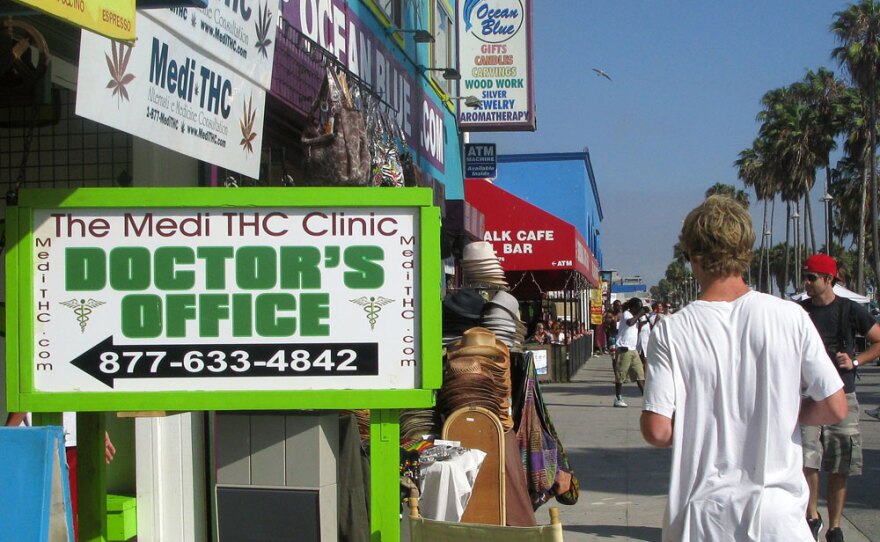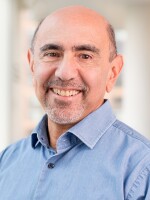More than a dozen years ago, California became the first state to legalize medical marijuana for people with serious illnesses. Many used it to relieve pain or other symptoms — and that's still true. But medical marijuana has now become a thriving business in California that serves a lot more than just sick people.
In some parts of Los Angeles, medical marijuana is more common than McDonalds or Starbucks. Places where you can buy a Big Mac or a double tall mocha latte are outnumbered by pot stores, at least 2 to 1.
All that's required to purchase the marijuana is a recommendation from a doctor. And a new iPhone app will even help you find the nearest dispensary.
A Perfunctory Exam
Doctors don't actually write prescriptions for marijuana. They give written recommendations that are often based on less-than-rigorous exams. Just ask Ron Haas.
"I can't really say that it was a real medical exam. As much as I'd like to, I can't. It wasn't," says Haas.
A 38-year-old film and television editor in Los Angeles, Haas went to see a doctor for the sole purpose of getting medical marijuana.
"I sat down, they said, 'What's wrong?'" he said.
"I said, I have chronic back pain, chronic ankle pain, chronic knee pain, chronic hips, wrists, elbows, everything. He said, "What are you using to treat?" I said marijuana. And he laughed and said, No, no, what kind? Sativa, indica, blends? And I said, I have no idea. And he said, "You will."
The Fate Of Proposition 215
It's not what most California voters had in mind when they approved Proposition 215, the medical marijuana law. Back then, it was billed as compassionate relief for people with cancer, HIV-AIDS, or glaucoma. People like Angel Raich.
"I had scoliosis, I had endometriosis, I had fibromyalgia, I had a lot!" Raich said. "And in '99, I found out I had a brain tumor."
Raich is allergic to most pharmaceutical drugs. So she uses marijuana to counteract nausea and stimulate her appetite.
"The fact of the matter is, medical cannabis does help, it's a natural plant," Raich said. "I'm very grateful for it, it's a miracle to me."
But critics say that for every person like Angel Raich, there are many more who use the medical marijuana law as a cover to buy recreational pot.
"I think 215 was a complete sham. I think this was a hoax," says Ron Brooks, a federal drug agent in San Francisco.
"And I would encourage any citizen to do this. Stand near a dispensary and watch who goes in," Brooks said.
"And tell me how many people look sick and dying. How many people look like they are suffering from catastrophic illness, and how many kids are standing around the corner where people buy marijuana inside the dispensary — and resell it to the kids outside for a profit," he adds.
Pot: Nearly Legal?
Those dispensaries have been multiplying ever since federal agents stopped raiding them earlier this year. Busting the storefronts is no longer a priority for the Justice Department, even though selling pot remains a federal crime. And local governments have been slow to regulate the dispensaries on their own.
And one of the people who co-wrote Proposition 215 believes the law has been subverted.
"What we have is de-facto legalization," said Scott Imler, a Methodist minister from West Hollywood.
Imler says he never envisioned that medicinal pot would turn into a business, open to virtually anyone.
"And if people are OK with that, then I guess there's no problem," Imler said. "If people have a problem with that, then we have to revisit how this is being done and scale it back to being a medical issue.
Jeff Jones, operator of the Patient ID Center in Oakland, admits that when he started 13 years ago, most of his clients were HIV positive. Now he says, most come in for chronic pain.
He doesn't believe marijuana is virtually legal in California. Not yet.
"Cannabis is probably easier to buy legally today than it has ever been in America, at least here in California," Jones said.
Copyright 2022 NPR. To see more, visit https://www.npr.org. 9(MDAzMjM2NDYzMDEyMzc1Njk5NjAxNzY3OQ001))







